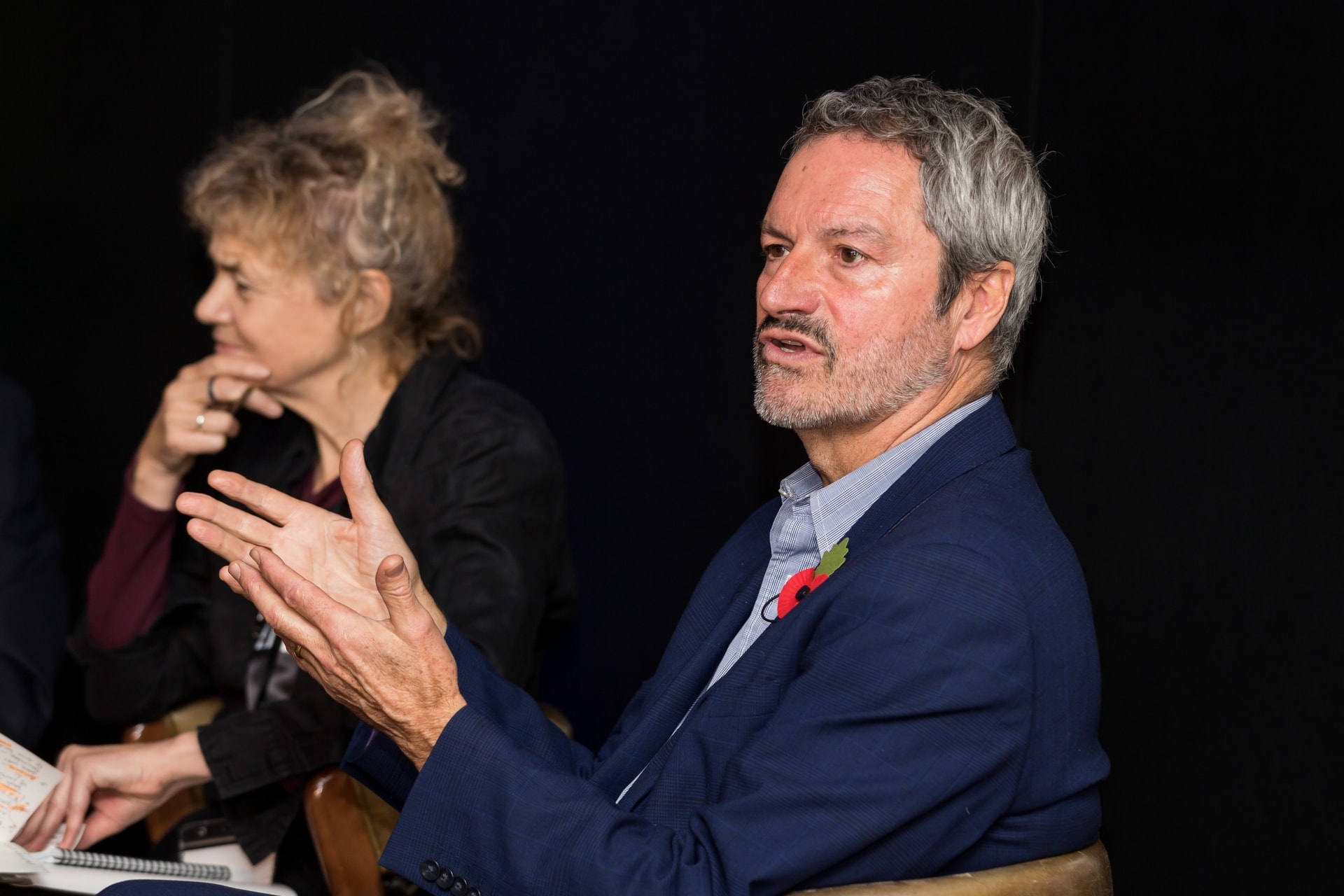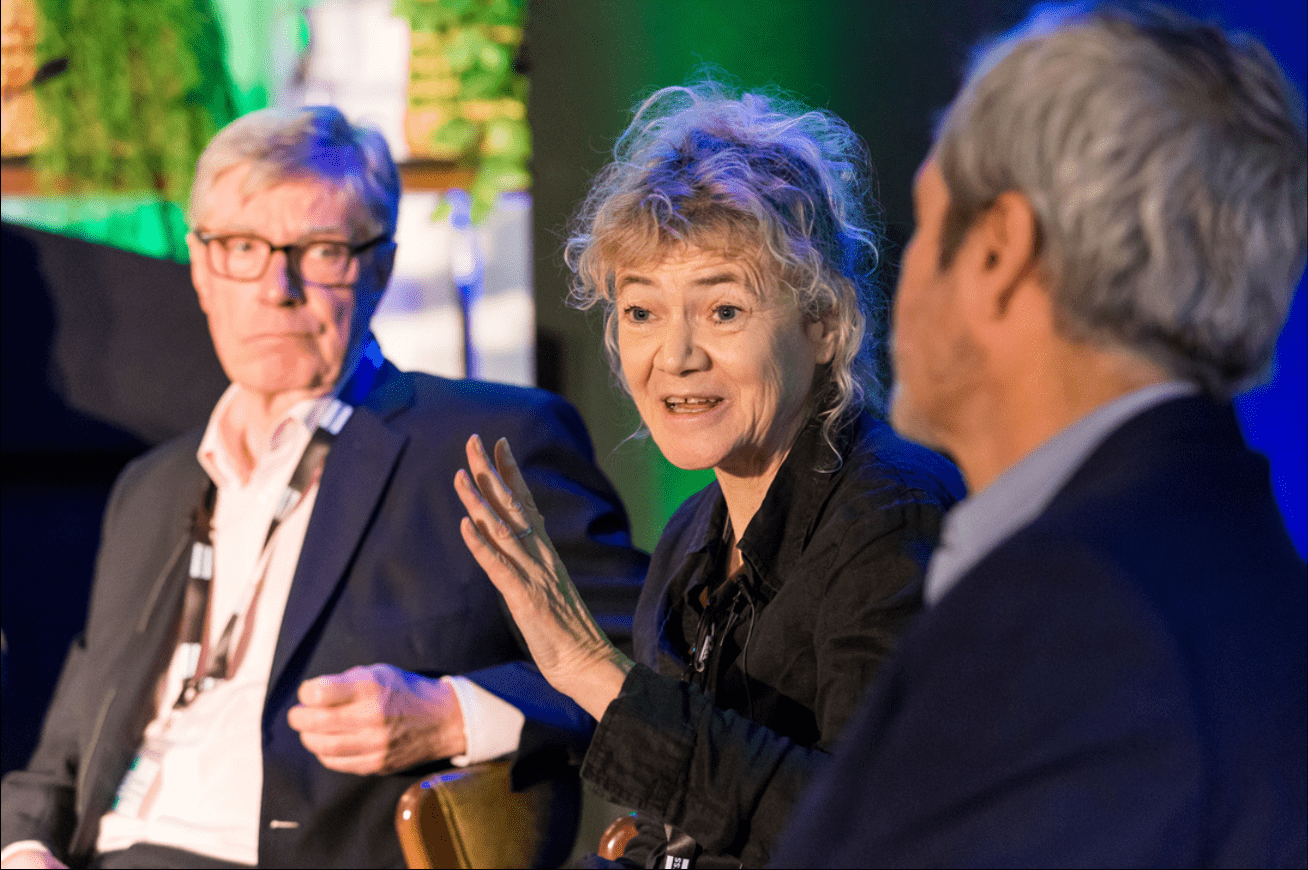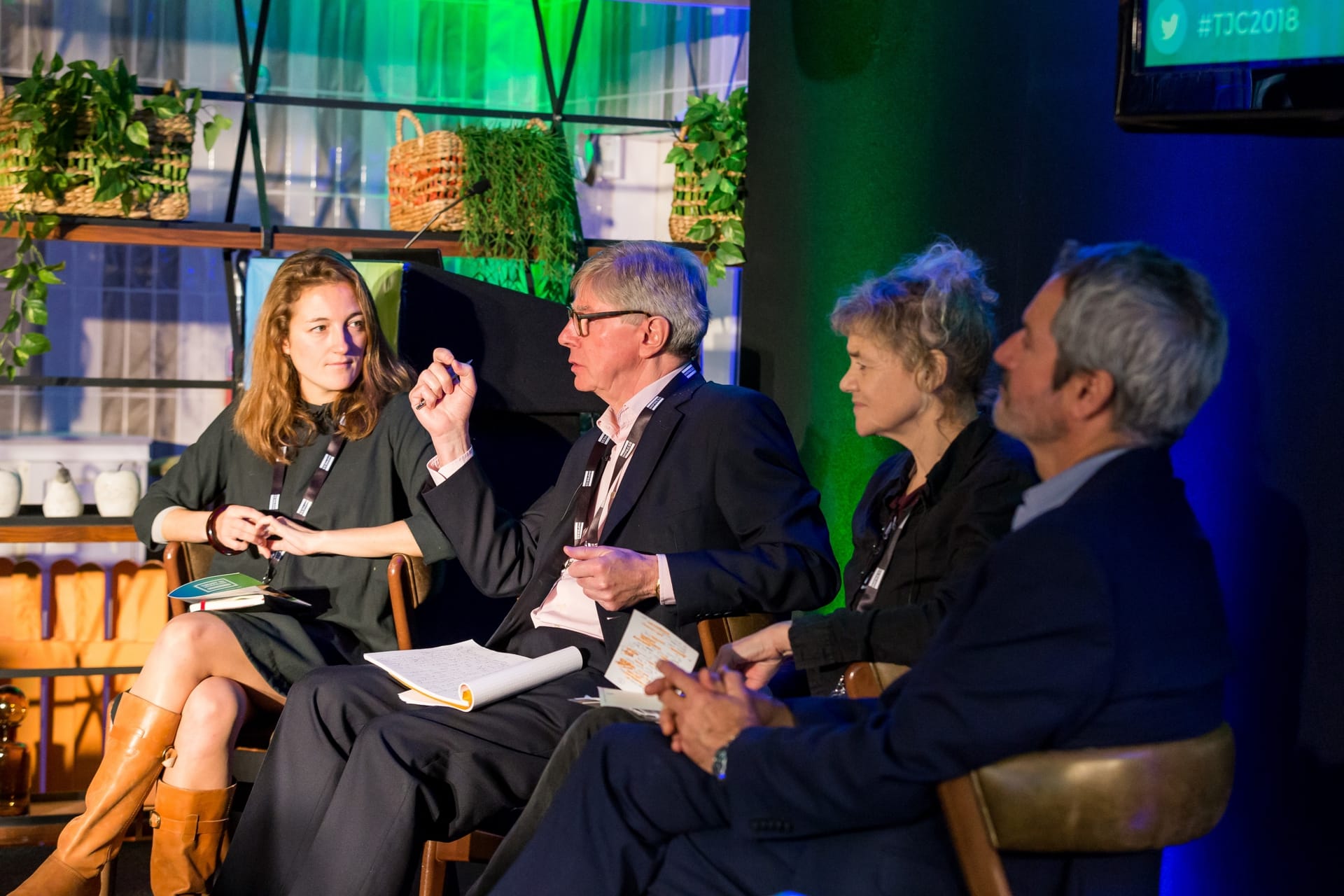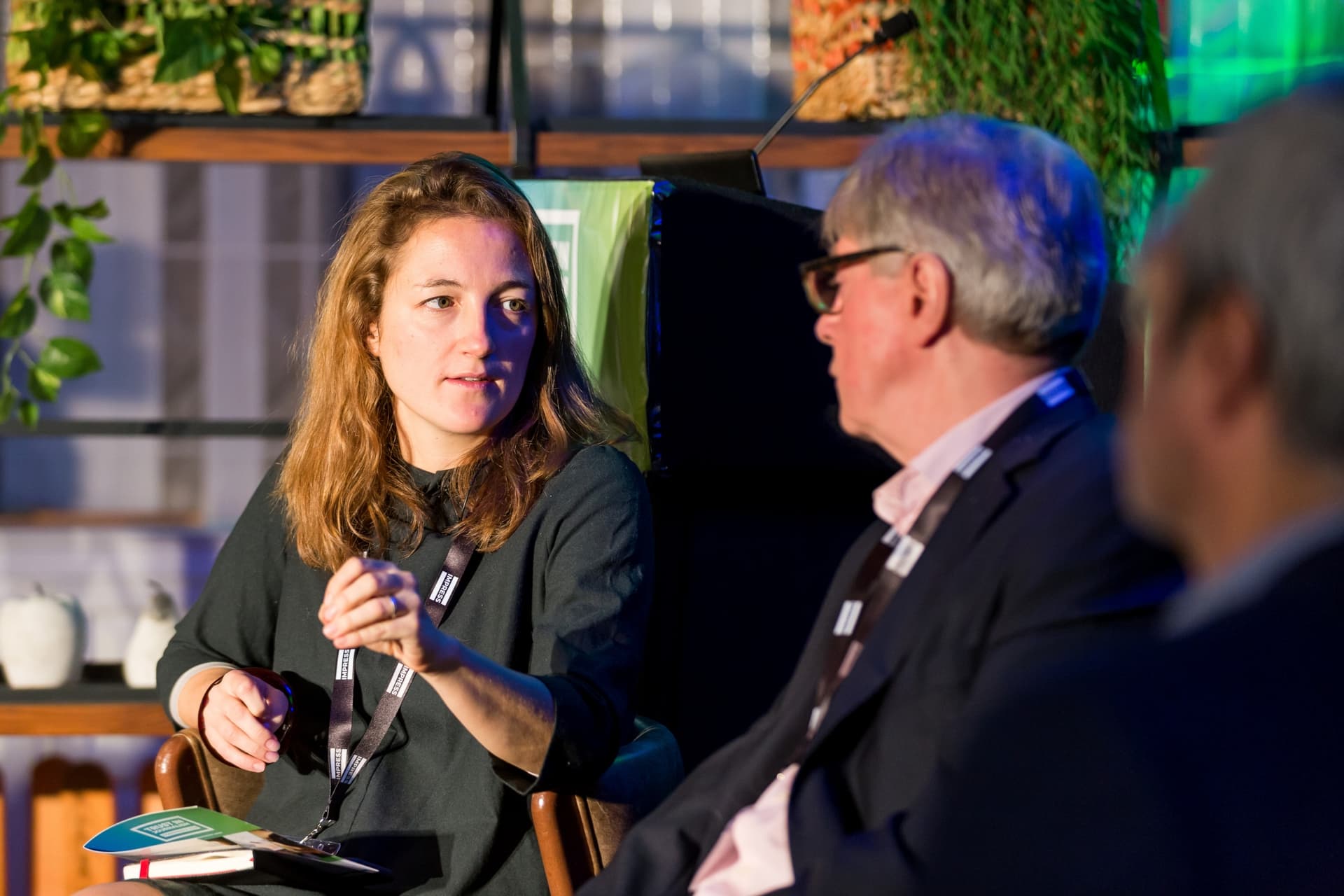Trust in Journalism Conference 2018
The Ethical Journalism Network’s Director, Chris Elliott, took part in a panel discussion on trust and partisan news at the IMPRESS Trust in Journalism Conference 2018. This article was originally published on the IMPRESS website. It has been republished with permission.
Gavin Esler: “We have to go back to the enlightenment values of facts”
The first panel of the Trust in Journalism Conference 2018 tackled the issue of partisanship and high-quality journalism. The big question: can journalism be both things at the same time? The discussion covered issues like journalistic biases, notions of balance in the news, the difference between news and comment, the relationship with analytics, and being a trusted guide in a polarised context.
Chairing the session was Mary Fitzgerlad, Editor-in-Chief of openDemocracy, who started by explaining how they work to keep openDemocracy non-partisan and added: “We don’t strive for balance, but we do strive for pluralism. For us, it’s about thinking what perspectives merit, have value, and which are not given a hearing elsewhere. But also how are we going to get those stories, those perspectives out, to people outside our bubble”.
The three speakers on the panel were: Gavin Esler (journalist and author, former BBC journalist), Vanessa Baird (co-editor of New Internationalist) and Chris Elliott (Director of the Ethical Journalism Network and former readers editor at the Guardian).
Gavin Esler started by speaking about his beginnings in journalism in the Belfast Telegraph: “it was a time when, for instance, the concept of balance was fairly easy”. Asked about his reflections on the ‘quest for neutrality in broadcasting’, based on his experience at the BBC, he said:

“I love the BBC. I think it’s a superb institution (…) It seems to me that every one of us in this room is here because we think we are in the truth business. We actually believe in enlightened values. We believe in facts, we believe in science. And as a journalist, I’ve always believed – and was always told – you have to be accurate, you have to be fair and you have to be balanced. Now, it seems to me that we also now live in Trump’s world – as the RAND Corporation says, ‘a world of truth decay’. And that presents absolutely existential risks to what we do. And American journalists have been grappling with that for a while. And we have to grapple with it.
In terms of balance (…) you can balance politically – you should balance politically. We should hear a vast range of voices. But you cannot balance someone who is lying with someone who is telling the truth. (…) The BBC and other broadcasters have reflected for 12 years that perhaps on climate change balancing people who know things with people who’ve read some books and think they know things is possibly wrong. And I worry that in 10 years’ time we will look back on the Brexit debate [and arrive to a similar conclusion] (…) In terms of the facts about the economy, or the likelihood predictions about the economy (…) do you really balance? I think that’s a really big problem. And if something has to go, it has to be that notion of balance“.
Asked about what that should be replaced with, Esler said: “I think we have to go back to the enlightenment values of facts”.
Second to speak was Vanessa Baird, co-editor of New Internationalist, who spoke about journalistic biases: “When it comes to combining partisanship and quality, I think you can do it if you do a good job of journalism, basically. You don’t let your opinions influence you when you come across inconvenient facts, you don’t twist the facts, you seek truth, you seek to tell the truth, and you speak to truth. You speak truth to power. But I think part of that truth is also recognising your own bias as well. And in that, I think it’s quite important to think about who we are as journalists and where we come from. That’s true in this country in terms of class, race, gender, everything. But it also is true for us particularly in terms of the voices that are coming from the global south.”
“When I saw the title of this session it reminded me of one time, we had a marketing consultant who came in to look at some of our marketing materials, and he re-wrote them. What he wrote was filled with words like ‘unbiased’, ‘balanced’, ‘non-partisan’ – and so we had to say ‘no, that’s not us’. And he was quite shocked, obviously. I think that we are partisan, with a small p. We don’t support any political party in any country that we’ve published in. But our perspective and our lenses is one of global justice, of human and environmental rights. And when we write about poverty and equality, we are looking at the roots of it. We are looking at the power dynamics. And that puts us at a certain political place. And also when I was thinking of the rest of the media, in Britain for example, I would say it’s all pretty partisan too”.

Mary Fitzgerald asked: “Is it more honest to be transparent about your perspective and your bias than to strive with this false neutrality, actually wearing your colours on your sleeve and showing where you come from?”.
Vanessa replied: “Yes, absolutely. It is more honest to be straightforward about where you come from, and your partisanship. When it comes to partisanship and bias, I think I am much more concerned by the bias that is going on under the surface and the lack of awareness. All bias that is produced by who is paying you, or who your advertisers are. I think the issue of native advertising now is particularly worrying in that area”.
Third to speak was Chris Elliott, Director of the Ethical Journalism Network, who referred to the important distinction between news and comment: “I think that it is the reporter’s job to do their best to write clear, fair, accurate, transparent copy about what they have seen and that that should be separate from comment and analysis. And I think this is become confused for all sorts of reasons. Newspapers have become so much more partisan in (…) the news columns, partly because of the kind of slow death of newspapers over the last 20, 30 years“.
Chris Elliott added: “I think we should stop obsessing about what is a journalist. I think we should be much more thoughtful about what is journalism. There are millions of people out there committing brilliant acts of journalism who are not conventional journalists. And I think we need to stop trying to put what is journalism into a box. If you look at Elliot Higgins for instance in Bellingcat you’ll realise that it’s that. And it’s not that I don’t believe in journalist training, it’s not that I don’t believe that people who want to be journalists should be qualified – I just think that you will go down a tunnel that you will not emerge from if you say it’s not a profession”.

Mary Fitzgerald also referred to the changes in newsgathering in this digital era: “Newsgathering is always about something which is going to sort of get the most eyeballs and shock or amaze people. And it is of course much more of a story if the side that won cheated. And that applies to everything. There’s a real dilemma there because it drives partisanship. The way we choose news stories, the way news editors sift and decide which are the biggest stories drives this partisanship and this polarization and actually now we all kind of live in these filter bubbles and technology is sort of fueling this as well. The classic partisanship of newspapers and newsgathering has been amplified”.
Opportunities in the ‘cacophony of the internet’
Gavin Esler added a positive note on the opportunities in this context:
There are really great opportunities. The word trust, if you can be a trusted guide through this deluge of nonsense that we get, then that is wonderful. That is gold“.
Chris Elliott also commented on the importance of working to ethical standards, following a commercial logic apart from the moral imperative of it:
You’ve got to work to decent ethical standards if you are ever going to stand out to the cacophony of the internet. There’s a moral imperative for that. But I can also make a commercial argument which is that who will pay for something they don’t trust. So whether it’s a membership scheme, or a paywall or anything else – unless you can win their trust, people are not going to part with money to keep this wonderful thing called journalism going”.
Vanessa Baird added:
I think that another positive thing (…) is that people are really aware of facts and fact checking and are much more demanding of journalists now. And I think that when we come out of this, the standards will be better. Because people are just much more aware that they have to really, really check and be careful (…) We’ve had some sort of surprises with the internet, in that we had expected that the short snappy pieces would do best. But what tends to do best are the sort of long, key note pieces which are sort of the long-read type, and really quite in-depth analysis”.
Mary Fitzgerald referred to the changes in newsgathering in this digital era:
Newsgathering is always about something which is going to sort of get the most eyeballs and shock or amaze people. And it is of course much more of a story if the side that won cheated. And that applies to everything. There’s a real dilemma there because it drives partisanship. The way we choose news stories, the way news editors sift and decide which are the biggest stories drives this partisanship and this polarization and actually now we all kind of live in these filter bubbles and technology is sort of fueling this as well. The classic partisanship of newspapers and newsgathering has been amplified”.
Asked about analytics as a new incentive for newsgathering, Chris Elliott said: “the business of analytics is really, really interesting. But I think we are a little frightened (…) I think you need to make it your servant and not your master. You have to remember that newspapers have never gone out of their way to publish things they didn’t think their readers wanted to read. Newspapers have a certain value. I think analytics are just a really tight end of that. And some people use it badly for clickbait, but the wise journalist uses it as a servant, it tells them stuff”.

Related Links From the IMPRESS Trust in Journalism Conference